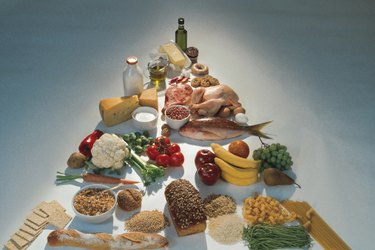
The general food group containing fats and sweets is the smallest food group, meaning that you should consume the least amount of foods from this group. Sweets tend to provide large amounts of "empty" calories with little nutritional value, while fats often provide large amounts of unhealthy fat and calories. Some fats are considered healthier than others, however. Pay attention to the exact types of foods and beverages classified as sweets and fats to understand overall healthy eating.
Sweets
Video of the Day
The sweets food group contains mostly foods that you should limit in your diet, according to the University of Pittsburgh Medical Center. Sweets include fatty desserts like cakes, brownies, cookies, ice cream and other high-fat, high-sugar treats. The group includes pies, puddings, cupcakes, doughnuts, muffins, sweet breads, candies, sugary spreads and syrups. Sweets can also include sugary beverages like soft drinks, sugary sports or energy drinks, lemonade and hot chocolate.
Video of the Day
Fats
Unlike sweets, fats are a more complicated type of food group, because some fats are actually good for you in moderation and others are best avoided altogether. All types of fats are very high in calories, however. Omega-3 fatty acids are a type of "good" fat found in fatty fish like mackerel, herring, sardines, trout, tuna and salmon, says the University of Pittsburgh Medical Center. Monounsaturated and polyunsaturated fats are also healthier types of fats found in nuts, nut butters and avocados, as well as olive, canola, safflower, sunflower, soybean, corn and sesame oils. The "bad" fats are saturated fats and hydrogenated or trans fats. Saturated fats are found in animal-based foods like fatty meats, high-fat dairy products, poultry skins and fast foods. Hydrogenated shortening, palm oil, cocoa butter and coconut oil as well as lard, butter and whole-milk dairy all contain saturated fats. Margarine, vegetable shortening, fried foods and processed snack foods contain trans fat.
Considerations
Although items in the sweets and fats food groups aren't very healthy, you don't have to eliminate them entirely from your diet. The typical recommendation for a heart-healthy diet allows up to 30 percent of your total calories to be derived from fat, which computes to 60 g or less of fat per day on an 1,800-calorie diet, says the University of Pittsburgh Medical Center. A heart-healthy diet further limits saturated and trans fats to less than 7 percent of your calories, equal to less than 14 g of "bad" fats per 1,800 calories per day. The United States Department of Agriculture or USDA also sets forth 100 to 300 "discretionary calories" per day, which typically include foods in the sweets and fats groups, according to MyPyramid.gov.
Warning
There are many negative health consequences of consuming too many fats and sweets, and many people include far too many foods from these groups in their diets, according to MyPyramid.gov. Aside from weight gain and obesity, consuming too many fats and sweets can lead to cardiovascular diseases and impaired heart health, warns the University of Pittsburgh Medical Center. Also, most high-fat foods and sweets contain large amounts of sugars and fats with little essential nutrients. Before you make any substantial changes to your diet, especially if you eliminate whole food groups, talk with your physician or a registered dietitian.
- University of Pittsburgh Medical Center: Heart-Healthy Diet
- MayoClinic.com: Exchange List – Sweets, Desserts and Other Carbohydrates
- MyPyramid.gov: Inside the Pyramid – What Are Discretionary Calories?
- University of Michigan Health System: Healthy Eating
- United States Department of Agriculture: MyPyramid.gov